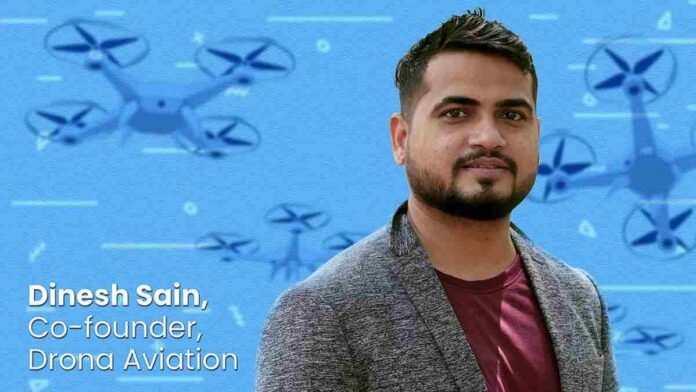Mumbai, Maharashtra-based Drona Aviation makes nano drones for schools and universities to educate, study, and explore. The company is one of India’s earliest drone flight controller manufacturers.
Despite its use in agriculture, delivery, and surveillance, nano drones have struggled to take off in India. Nano drones weigh 250 grams and are utilized in military operations, tracking and control systems, cinematography, and other applications. The Ministry of Defence wishes to buy nano drones for special operations surveillance by the Indian Army.
Drona Aviation is one of the few drone manufacturers in India that manufactures nano drones in-house and educates students in schools and universities how to build them using beginning kits. Only it designs and manufactures flying controls.
Dinesh Sain, an IIT Bombay alum who was interested in drones and wanted to work in aerospace, encountered no similar aerospace opportunities during his university placement. “AirBus came, and there were no relevant roles,” he said to the press.
He discovered the most potential in lightweight drones. According to Technavio, the education drone sector will be worth $500 million by 2026, while the nano drone market will be worth $4.81 billion by 2027.
In 2014, he co-founded Drona Aviation with college alumni Prasanna Shevare and Apurva Godbole, using Rs 65 lakh of his own money. In 2015, IIT Bombay invested Rs 10 lakh in the firm.
He also recognized that firms were not educating students from the beginning how to make drones, which contributed to the sector’s lack of job opportunities. The co-founders decided to educate children how to build drones.
The Mumbai-based company presented Pluto X, a Ready-to-Fly (RTF) nano-drone. UniBus might also be used to link sensors, LEDs, servos, and other accessories. It is compatible with ROS image processing.
“Pluto was launched after two years of research in 2016, and today, 23 IITs and students from 200+ colleges have already used Pluto for their experiments,” says Drone Aviation’s Co-founder and COO. “There are around 30 variations of Pluto that students use today,” he adds, adding that Pluto 1.2 is a complex drone that students build before flying.
Drona Aviation manufactures Pluto X and Pluto 1.2, as well as accessories such as the Wi-Fi camera, X-ranging, X-breakout, X-hybrid, Rover-x, and BigQuad. Even though the nano drone industry is new, there are drone programs in India.
“We design and build drones, which is unusual in India,” Sain explains. “With Pluto, we are providing a whole ecosystem to learn, teach, and experiment with drones.”
There are no flight controller manufacturers in India. “We import ICs and other raw materials from China to make them,” he explains. Drona Aviation flight controllers are only available to students.
In 2019, Drona Aviation and NITI Aayog’s AIM collaborated to develop a drone module. AIM-selected educators from throughout the country took part in the Atal Tinkering Labs “Train the Trainer” program.
Drona Aviation is expected to end the fiscal year 2022-23 with Rs 1.85 crore in sales, primarily from B2B and 15%-20% from ecommerce. Sain is in charge of operations, with co-founders Shevare (CTO) and Goldbole (CEO) working behind the scenes. The company employs 12 people.
Despite the complexity of building tiny drones, Pluto is sometimes likened to Chinese toy drones. Sain believes that the most difficult problem has been raising awareness about drones in schools.
“We are offering Pluto at a price point ranging between Rs 7,200 and Rs 14,000, which is cost-effective when compared to its global counterparts with similar programming and modularity, but people still compare the price with available cheap drones,” he says. Pluto drones are available via Amazon, Drona Aviation, and numerous robotics markets. Sain stated that the company will expand into ten more areas this year.
The Arduino and Raspberry Pi of drone education should be Pluto. Since its inception, the company has served 8,000 Indian schools. In the next two to three years, the company intends to reach one lakh schools and 600 institutions in India, as well as deploy Pluto-powered (white-labeled) drones for education in the United States, Australia, and Europe. The same is being negotiated by three partners.
The objective is to reach 50,000 schools outside of India in three years and collaborate with industries to commercialize nano drones.



